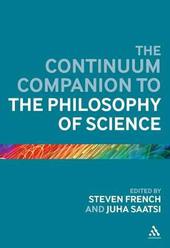
|
The Continuum Companion to the Philosophy of Science
Hardback
Main Details
| Title |
The Continuum Companion to the Philosophy of Science
|
| Authors and Contributors |
Edited by Steven French
|
|
Edited by Dr Juha Saatsi
|
| Series | Bloomsbury Companions |
|---|
| Physical Properties |
| Format:Hardback | | Pages:464 | | Dimensions(mm): Height 234,Width 156 |
|
| Category/Genre | Philosophy
Philosophy of science |
|---|
| ISBN/Barcode |
9781441187611
|
| Classifications | Dewey:501 |
|---|
| Audience | | Postgraduate, Research & Scholarly | | Professional & Vocational | |
|---|
|
Publishing Details |
| Publisher |
Continuum Publishing Corporation
|
| Imprint |
Continuum Publishing Corporation
|
| Publication Date |
9 June 2011 |
| Publication Country |
United States
|
Description
The Continuum Companion to the Philosophy of Science offers the definitive guide to a key area of contemporary philosophy. The book covers all the fundamental questions asked by the philosophy of science - areas that have continued to attract interest historically as well as topics that have emerged more recently as active areas of research. Sixteen specially commissioned essays from an international team of experts reveal where important work continues to be done in the area and, most valuably, the exciting new directions the field is taking. The Companion explores issues pertaining to the philosophy of specific sciences (physics, biology, neuroscience, economics, chemistry and mathematics) and general issues in the field, such as explanation, realism, representation, evidence, reduction, laws, causation and confirmation. Featuring a series of indispensable research tools, including an A to Z of key terms and concepts, a chronology, a detailed list of resources and a fully annotated bibliography, this is the essential reference tool for anyone working in contemporary philosophy of science.
Author Biography
Steven French is Professor of the Philosophy of Science at the University of Leeds. He is the author of Science and Partial Truth (2003) and numerous articles on the philosophy of science. Juha Saatsi is Lecturer in Philosophy at the University of Leeds, UK. He is the co-editor (with Steven French and Dean Rickles) of The Structural Foundations of Quantum Gravity (2006).
Reviews'...This Continuum Companion provides a comprehensive approach to the field with uniformly well-written essays...The study as a whole is an ably drawn compendium of a wide range of problems, together with a forward-looking perspective on emerging trends in the field...This will be an important reference work for all collections in the philosophy of science.' -- Choice * Choice * Written with an eye on future developments, The Continuum Companion to the Philosophy of Science surveys the current state of the philosophy of science. All the articles are new and written in a fresh style by topnotch people, many of whom are established figures in the field. -- Martin Curd * Metascience * One of the strongest points of this companion, in comparison to other recently published companions to the philosophy of science, is that the editors go into great effort to outline currently growing problems and positions in philosophy of science and in this way provide a valuable guide to the topics that are likely to dominate the future of the discipline. As a consequence, the Companion offers not only a presentation of the central issues in philosophy of science today, but also indicates the most exciting current and future topics of research, making it a necessary tool not only for students who are looking to familiarise themselves with particular issues in philosophy of science, but for any researcher interested in the development of the discipline . . . French and Saatsi's The Continuum Companion to the Philosophy of Science is the most contemporary companion to philosophy of science and will serve not only as a valuable source to the major topics in philosophy of science to students but also to any academic interested in the development of this field. -- Milena Ivanova * Science and Education * Because all the essays touch upon recent issues in the philosophy of science, this book acts not only as an introduction to newcomers but also as a handy resource for specialists. -- Giacomo Borbone, Catania University * Philosophy in Review *
|